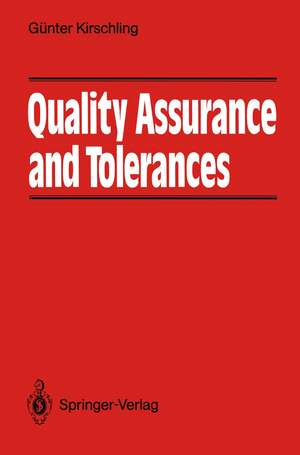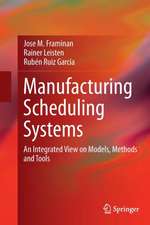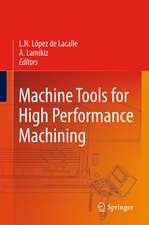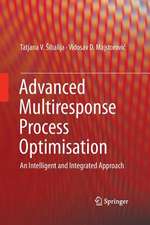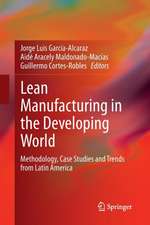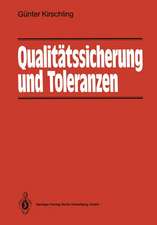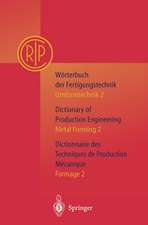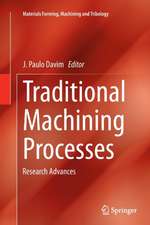Quality Assurance and Tolerance
Autor Günter Kirschling Traducere de Sue Greeneren Limba Engleză Paperback – 19 mai 2012
Preț: 642.83 lei
Preț vechi: 756.27 lei
-15% Nou
Puncte Express: 964
Preț estimativ în valută:
123.01€ • 131.54$ • 102.56£
123.01€ • 131.54$ • 102.56£
Carte tipărită la comandă
Livrare economică 18 aprilie-02 mai
Preluare comenzi: 021 569.72.76
Specificații
ISBN-13: 9783642486913
ISBN-10: 3642486916
Pagini: 348
Ilustrații: X, 335 p.
Dimensiuni: 155 x 235 x 18 mm
Greutate: 0.49 kg
Ediția:Softcover reprint of the original 1st ed. 1991
Editura: Springer Berlin, Heidelberg
Colecția Springer
Locul publicării:Berlin, Heidelberg, Germany
ISBN-10: 3642486916
Pagini: 348
Ilustrații: X, 335 p.
Dimensiuni: 155 x 235 x 18 mm
Greutate: 0.49 kg
Ediția:Softcover reprint of the original 1st ed. 1991
Editura: Springer Berlin, Heidelberg
Colecția Springer
Locul publicării:Berlin, Heidelberg, Germany
Public țintă
Professional/practitionerCuprins
1 Introduction.- 2 Concepts.- 3 Probability Calculation.- 3.1 Definition of Probability.- 3.2 Addition Formula (OR Formula).- 3.3 Multiplication Formula (AND Formula).- 4 Probability Distributions of Quantitative Characteristics.- 4.1 General.- 4.2 Normal Distribution.- 4.3 Abnormal Probability Distributions.- 4.4 Random Spread for Mean Values.- 5 Mathematical and Graphical Evaluation of Dimensional Series.- 5.1 General.- 5.2 Mathematical Evaluation Without Classification.- 5.3 Graphical Evaluation Without Classification.- 5.4 Mathematical Evaluation of Classified Dimensional Series.- 5.5 Graphical Evaluation of Classified Dimensional Series.- 5.6 Other Statistical Characteristics.- 5.7 The Significance of Statistical Characteristics.- 6 Mixed Distributions.- 6.1 Types of Mixed Distribution.- 6.2 Mixed Distribution Type 1.- 6.3 Mixed Distribution Type 2.- 6.4 Tschebyscheff’s Extreme Case.- 7 Distribution Folds.- 7.1 Description of Fold Methods.- 7.2 Examples of Folding Methods.- 8 Relationship Between Tolerances and Production Distributions.- 8.1 Direct and Indirect Function Characteristics.- 8.2 Establishment and Observance Tolerances.- 8.3 Tolerances and Costs.- 8.4 Errors and Waste.- 8.5 Arithmetical Tolerance Calculation.- 8.6 Examples for Arithmetically Calculated Linear Dimensional Chains.- 8.7 The Sorting of Non-Conforming Parts.- 9 Tolerance Calculation Using Square Law.- 10 Statistical Calculation of Tolerances of Individual Values with Rectangular Distributions.- 10.1 General.- 10.2 Derivation of Reduction and Expansion Factors with Equal Individual Tolerances.- 10.3 Calculation of Dimensional Chains with Unequal Individual Tolerances and Rectangular Individual Distributions.- 10.4 Advantages of the Assumption of the Presence of Rectangular Distributions.-11 Statistical Tolerance Calculation of Individual Values with Trapezoid Distribution or with Triangular Distribution.- 11.1 Method of Calculation.- 11.2 Simple Formula to Check Fixed Linear Dimensional Chains.- 12 The Tolerance Model.- 13 Assessment of Completed Batches and Production Batches.- 13.1 General.- 13.2 Random Sample Dimension Tests.- 13.3 Selection of AQL Values for Random Sample Tests of Dimensions (Variable Testing).- 13.4 Quality Control Charts for Dimensions.- 14 Process Analysis and Process Capability.- 14.1 Process Analysis.- 14.2 Process Capability.- 15 Process Control.- 15.1 General Aspects.- 15.2 Process Control by Mean Value Quality Control Charts.- 15.3 Process Control by Original Value QCC’s.- 15.4 Process Correction.- 16 Bibliography.- 17 Appendix.- Tables.
